奥巴马的最经典演讲
奥巴马胜选演讲稿全文

奥巴马胜选演讲稿全文中新网11月7日电据美国媒体报道,成功连任美国总统的奥巴马当地时间7日凌晨发表了胜选演讲,对支持者表示感谢。
当地时间7日凌晨,美国总统大选初步结果出炉,美国总统奥巴马获得超过270张选举人票,成功连任。
最新的开票结果显示,奥巴马获得了303张选举人票,共和党总统候选人罗姆尼获得2019年中,成功带领美国前进。
以下为奥巴马演讲全文:谢谢,非常感谢。
今晚,是在一个殖民地赢得它自主权2019年之后,我们来到这里,不断前行,这主要是因为你们坚信这个国家能够实现永恒的希望,实现移民想的梦想,我们是一个大家庭,我们共同以一个国家,一个民族奋斗。
我要感谢每位参加这次选举的人,不管你是从第一天就投票了,还是一直等待了很长的时间才投的票。
当然了,我们要解决这个排队投票的问题。
不管你是自己上门投的票,还是打电话投的票,不管你是投了给我,还是投给罗姆尼,你的声音都被大家听到了,并且你对我们国家做出了某些改变,刚刚我跟罗姆尼通了电话,我祝贺他在这个艰难卓绝的战役当中所取得的胜利。
我们这场战役是十分激烈,但是这正是因为我们深爱着这个国家,并且我们十分在意他的未来。
从罗姆尼整个家庭,孙子辈,孩子辈,整个家庭都献给了美国,这种精神我们将永远铭记。
未来这几周我也希望和罗姆尼一起来讨论怎么样使我们的国家不断前进。
我要感谢我的朋友,我的搭档,这是我四年来最好的搭档,也是美国历史上最好的副总统John baidn(音,校对)如果没有他,今天我就不会站在这里,如果没有2019年前跟我结婚的妻子,今天我就不会站在这里。
我要跟大家说,妻子,我比以前更加爱你,我更加自豪,因为我看到全国人民也十分热爱你这位第一夫人,我感到十分自豪。
对我的女儿,两位女儿,你们一天天在成长,你们成为了两位向你们的妈妈一样的淑女、美丽,有才华,我也为你们感到骄傲,但是目前我觉得给你们养一条宠物狗就够了。
我还要感谢我的竞选团队和志愿者,他们是历史上最棒的。
奥巴马演讲稿大全集
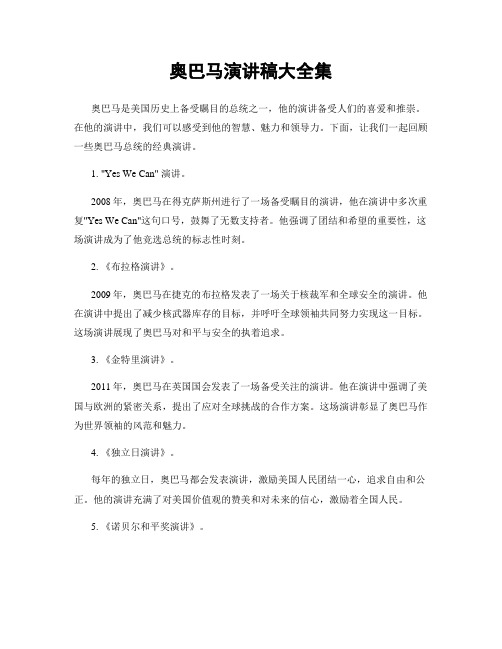
奥巴马演讲稿大全集奥巴马是美国历史上备受瞩目的总统之一,他的演讲备受人们的喜爱和推崇。
在他的演讲中,我们可以感受到他的智慧、魅力和领导力。
下面,让我们一起回顾一些奥巴马总统的经典演讲。
1. "Yes We Can" 演讲。
2008年,奥巴马在得克萨斯州进行了一场备受瞩目的演讲,他在演讲中多次重复"Yes We Can"这句口号,鼓舞了无数支持者。
他强调了团结和希望的重要性,这场演讲成为了他竞选总统的标志性时刻。
2. 《布拉格演讲》。
2009年,奥巴马在捷克的布拉格发表了一场关于核裁军和全球安全的演讲。
他在演讲中提出了减少核武器库存的目标,并呼吁全球领袖共同努力实现这一目标。
这场演讲展现了奥巴马对和平与安全的执着追求。
3. 《金特里演讲》。
2011年,奥巴马在英国国会发表了一场备受关注的演讲。
他在演讲中强调了美国与欧洲的紧密关系,提出了应对全球挑战的合作方案。
这场演讲彰显了奥巴马作为世界领袖的风范和魅力。
4. 《独立日演讲》。
每年的独立日,奥巴马都会发表演讲,激励美国人民团结一心,追求自由和公正。
他的演讲充满了对美国价值观的赞美和对未来的信心,激励着全国人民。
5. 《诺贝尔和平奖演讲》。
获得诺贝尔和平奖后,奥巴马发表了一场备受关注的演讲。
他在演讲中谦虚地接受了这一荣誉,并表达了对和平与正义的承诺。
这场演讲展现了奥巴马作为和平使者的使命感和责任感。
奥巴马的演讲风格优美、深刻,他的言辞充满力量和感染力。
他的演讲不仅在当时引起了轰动,而且至今仍然被人们传颂。
通过回顾奥巴马总统的经典演讲,我们可以更好地理解他的领导风范和价值观,也能够从中汲取力量和启发。
希望奥巴马的演讲能够继续激励着我们,引领着我们走向更美好的未来。
关于奥巴马著名的演讲
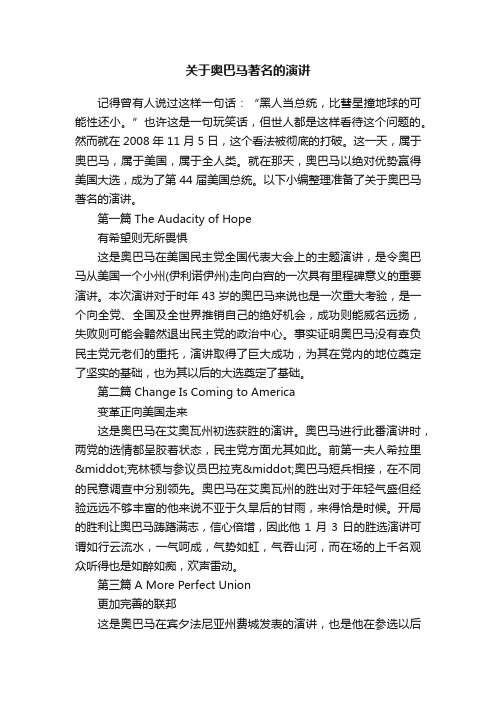
关于奥巴马著名的演讲记得曾有人说过这样一句话:“黑人当总统,比彗星撞地球的可能性还小。
”也许这是一句玩笑话,但世人都是这样看待这个问题的。
然而就在2008年11月5日,这个看法被彻底的打破。
这一天,属于奥巴马,属于美国,属于全人类。
就在那天,奥巴马以绝对优势赢得美国大选,成为了第44届美国总统。
以下小编整理准备了关于奥巴马著名的演讲。
第一篇 The Audacity of Hope有希望则无所畏惧这是奥巴马在美国民主党全国代表大会上的主题演讲,是令奥巴马从美国一个小州(伊利诺伊州)走向白宫的一次具有里程碑意义的重要演讲。
本次演讲对于时年43岁的奥巴马来说也是一次重大考验,是一个向全党、全国及全世界推销自己的绝好机会,成功则能威名远扬,失败则可能会黯然退出民主党的政治中心。
事实证明奥巴马没有辜负民主党元老们的重托,演讲取得了巨大成功,为其在党内的地位奠定了坚实的基础,也为其以后的大选奠定了基础。
第二篇 Change Is Coming to America变革正向美国走来这是奥巴马在艾奥瓦州初选获胜的演讲。
奥巴马进行此番演讲时,两党的选情都呈胶着状态,民主党方面尤其如此。
前第一夫人希拉里·克林顿与参议员巴拉克·奥巴马短兵相接,在不同的民意调查中分别领先。
奥巴马在艾奥瓦州的胜出对于年轻气盛但经验远远不够丰富的他来说不亚于久旱后的甘雨,来得恰是时候。
开局的胜利让奥巴马踌躇满志,信心倍增,因此他1月3日的胜选演讲可谓如行云流水,一气呵成,气势如虹,气吞山河,而在场的上千名观众听得也是如醉如痴,欢声雷动。
第三篇 A More Perfect Union更加完善的联邦这是奥巴马在宾夕法尼亚州费城发表的演讲,也是他在参选以后第一次就种族问题发表公开演讲。
2008年初的初选过程中,奥巴马皈依的芝加哥圣三位一体联合__教会牧师赖特以前在布道时发表的一些仇恨白人和反美的激情演讲片段被媒体公布,全国顿时一片哗然,奥巴马顿时陷入严重的信任危机。
(完整word版)奥巴马传奇演讲AMorePerfectUnion一个更完美的城邦中英对译
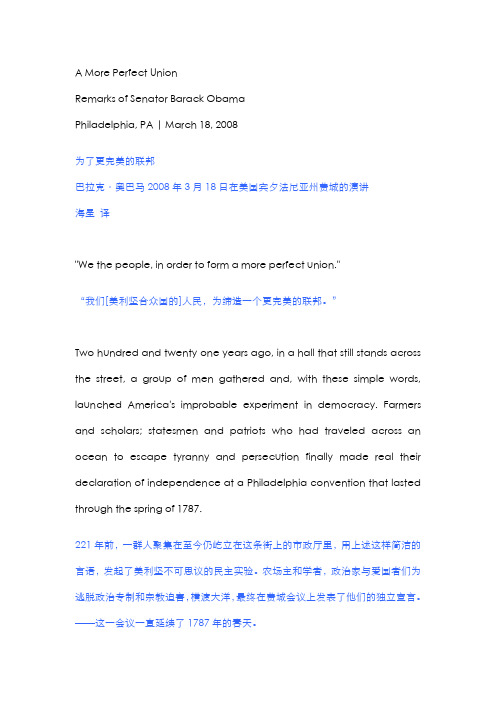
A More Perfect UnionRemarks of Senator Barack ObamaPhiladelphia, PA | March 18, 2008为了更完美的联邦巴拉克·奥巴马2008年3月18日在美国宾夕法尼亚州费城的演讲海星译"We the people, in order to form a more perfect union."“我们[美利坚合众国的]人民,为缔造一个更完美的联邦。
”Two hundred and twenty one years ago, in a hall that still stands across the street, a group of men gathered and, with these simple words, launched America's improbable experiment in democracy. Farmers and scholars; statesmen and patriots who had traveled across an ocean to escape tyranny and persecution finally made real their declaration of independence at a Philadelphia convention that lasted through the spring of 1787.221年前,一群人聚集在至今仍屹立在这条街上的市政厅里,用上述这样简洁的言语,发起了美利坚不可思议的民主实验。
农场主和学者,政治家与爱国者们为逃脱政治专制和宗教迫害,横渡大洋,最终在费城会议上发表了他们的独立宣言。
——这一会议一直延续了1787年的春天。
The document they produced was eventually signed but ultimately unfinished. It was stained by this nation's original sin of slavery, a question that divided the colonies and brought the convention to a stalemate until the founders chose to allow the slave trade to continue for at least twenty more years, and to leave any final resolution to future generations.他们讨论出的文件得以签署通过但尚未最终完成。
米歇尔奥巴马演讲稿
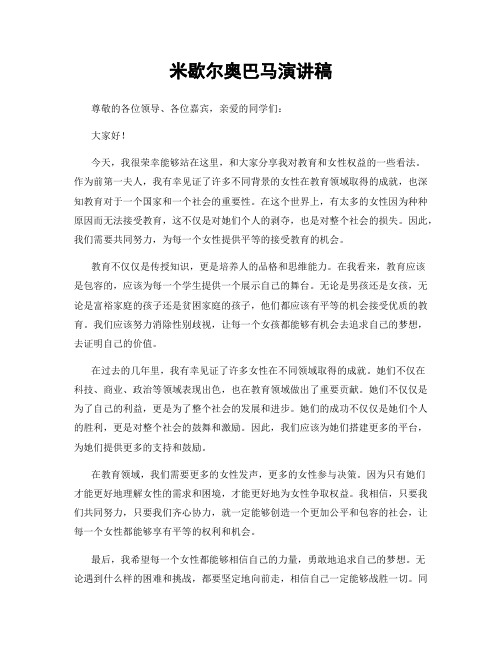
米歇尔奥巴马演讲稿尊敬的各位领导、各位嘉宾,亲爱的同学们:大家好!今天,我很荣幸能够站在这里,和大家分享我对教育和女性权益的一些看法。
作为前第一夫人,我有幸见证了许多不同背景的女性在教育领域取得的成就,也深知教育对于一个国家和一个社会的重要性。
在这个世界上,有太多的女性因为种种原因而无法接受教育,这不仅是对她们个人的剥夺,也是对整个社会的损失。
因此,我们需要共同努力,为每一个女性提供平等的接受教育的机会。
教育不仅仅是传授知识,更是培养人的品格和思维能力。
在我看来,教育应该是包容的,应该为每一个学生提供一个展示自己的舞台。
无论是男孩还是女孩,无论是富裕家庭的孩子还是贫困家庭的孩子,他们都应该有平等的机会接受优质的教育。
我们应该努力消除性别歧视,让每一个女孩都能够有机会去追求自己的梦想,去证明自己的价值。
在过去的几年里,我有幸见证了许多女性在不同领域取得的成就。
她们不仅在科技、商业、政治等领域表现出色,也在教育领域做出了重要贡献。
她们不仅仅是为了自己的利益,更是为了整个社会的发展和进步。
她们的成功不仅仅是她们个人的胜利,更是对整个社会的鼓舞和激励。
因此,我们应该为她们搭建更多的平台,为她们提供更多的支持和鼓励。
在教育领域,我们需要更多的女性发声,更多的女性参与决策。
因为只有她们才能更好地理解女性的需求和困境,才能更好地为女性争取权益。
我相信,只要我们共同努力,只要我们齐心协力,就一定能够创造一个更加公平和包容的社会,让每一个女性都能够享有平等的权利和机会。
最后,我希望每一个女性都能够相信自己的力量,勇敢地追求自己的梦想。
无论遇到什么样的困难和挑战,都要坚定地向前走,相信自己一定能够战胜一切。
同时,我也希望每一个男性都能够尊重和支持女性,让我们共同努力,创造一个更加美好的未来。
谢谢大家!。
奥巴马最经典十首英文演讲
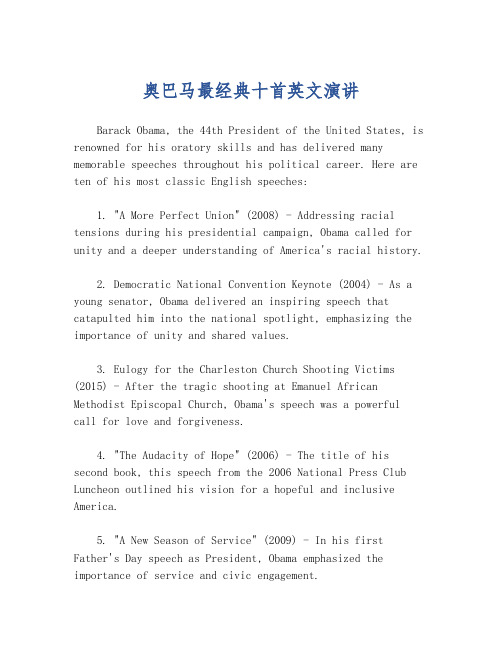
奥巴马最经典十首英文演讲Barack Obama, the 44th President of the United States, is renowned for his oratory skills and has delivered many memorable speeches throughout his political career. Here are ten of his most classic English speeches:1. "A More Perfect Union" (2008) - Addressing racial tensions during his presidential campaign, Obama called for unity and a deeper understanding of America's racial history.2. Democratic National Convention Keynote (2004) - As a young senator, Obama delivered an inspiring speech that catapulted him into the national spotlight, emphasizing the importance of unity and shared values.3. Eulogy for the Charleston Church Shooting Victims (2015) - After the tragic shooting at Emanuel African Methodist Episcopal Church, Obama's speech was a powerfulcall for love and forgiveness.4. "The Audacity of Hope" (2006) - The title of his second book, this speech from the 2006 National Press Club Luncheon outlined his vision for a hopeful and inclusive America.5. "A New Season of Service" (2009) - In his firstFather's Day speech as President, Obama emphasized the importance of service and civic engagement.6. "The Future of Our Children" (2010) - Addressing education reform, Obama called for a commitment to improving schools and opportunities for all children.7. "Change We Can Believe In" (2008) - A central theme of his presidential campaign, this speech highlighted the need for change and the potential of the American people.8. "A Call to Renewal" (2006) - At the Call to Renewal conference, Obama discussed the role of faith in politics and the importance of social justice.9. "The State of Our Union" (2012) - In this State of the Union address, Obama outlined his vision for a strong and prosperous America.10. "Farewell Address" (2017) - As he prepared to leave office, Obama reflected on his presidency, the progress made, and the challenges that lay ahead for the country.Each of these speeches showcases Obama's eloquence and his ability to connect with audiences on a deeply emotional level, inspiring hope and action in the face of adversity.。
奥巴马成功上任的演讲

奥巴马成功上任的演讲奥巴马议员有着美国议会中最为慷慨的投票记录。
以下是店铺为大家整理的关于奥巴马成功上任的演讲,欢迎阅读!奥巴马成功上任的演讲1:奥巴马第的就职演讲稿(译文)各位同胞:今天我站在这里,为眼前的重责大任感到谦卑,对各位的信任心怀感激,对先贤的牺牲铭记在心。
我要谢谢布什总统为这个国家的服务,也感谢他在政权转移期间的宽厚和配合。
四十四位美国人发表过总统就职誓言,这些誓词或是在繁荣富强及和平宁静之际发表,或是在乌云密布,时局动荡之时。
在艰困的时候,美国能箕裘相继,不仅因为居高位者有能力或愿景,也因为人民持续对先人的抱负有信心,也忠于创建我国的法统。
因此,美国才能承继下来。
因此,这一代美国人必须承继下去。
现在大家都知道我们正置身危机核心,我国正处于对抗深远暴力和憎恨的战争。
我们的经济元气大伤,是某些人贪婪且不负责任的后果,也是大众未能做出艰难的选择,为国家进入新时代做淮备所致。
许多人失去房子,丢了工作,生意垮了。
我们的医疗照护太昂贵,学校教育辜负了许多人。
每天都有更多证据显示,我们利用能源的方式壮大我们的对敌,威胁我们的星球。
这些都是得自资料和统计数据的危机指标。
比较无法测量但同样深沉的,是举国信心尽失─持续担心美国将无可避免地衰退,也害怕下一代一定会眼界变低。
今天我要告诉各位,我们面临的挑战是真的,挑战非常严重,且不在少数。
它们不是可以轻易,或在短时间内解决。
但是,美国要了解,这些挑战会被解决。
在这一天,我们聚在一起,因为我们选择希望而非恐惧,有意义的团结而非纷争和不合。
在这一天,我们来此宣示,那些无用的抱怨和虚伪的承诺已终结,那些扭曲我们政治已久的相互指控和陈旧教条已终结。
我们仍是个年轻的国家,但借用圣经的话,摆脱幼稚事物的时刻到来了,重申我们坚忍精神的时刻到来了,选择我们更好的历史,实践那种代代传承的珍贵权利,那种高贵的理念:就是上帝的应许,我们每个人都是平等的,每个人都是自由的,每个人都应该有机会追求全然的幸福。
奥巴马80后励志演讲稿:男人的责任
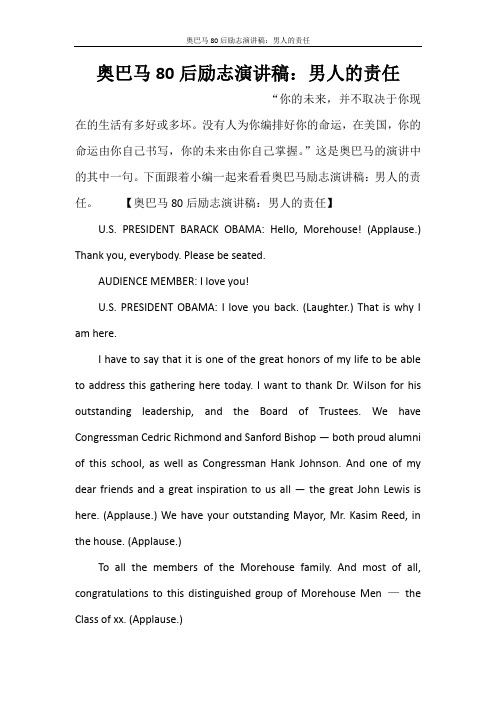
奥巴马80后励志演讲稿:男人的责任“你的未来,并不取决于你现在的生活有多好或多坏。
没有人为你编排好你的命运,在美国,你的命运由你自己书写,你的未来由你自己掌握。
”这是奥巴马的演讲中的其中一句。
下面跟着小编一起来看看奥巴马励志演讲稿:男人的责任。
【奥巴马80后励志演讲稿:男人的责任】U.S. PRESIDENT BARACK OBAMA: Hello, Morehouse! (Applause.) Thank you, everybody. Please be seated.AUDIENCE MEMBER: I love you!U.S. PRESIDENT OBAMA: I love you back. (Laughter.) That is why I am here.I have to say that it is one of the great honors of my life to be able to address this gathering here today. I want to thank Dr. Wilson for his outstanding leadership, and the Board of Trustees. We have Congressman Cedric Richmond and Sanford Bishop — both proud alumni of this school, as well as Congressman Hank Johnson. And one of my dear friends and a great inspiration to us all — the great John Lewis is here. (Applause.) We have your outstanding Mayor, Mr. Kasim Reed, in the house. (Applause.)To all the members of the Morehouse family. And most of all, congratulations to this distinguished group of Morehouse Men —the Class of xx. (Applause.)I have to say that it’s a little hard to follow —not Dr. Wilson, but a skinny guy with a funny name. (Laughter.) Betsegaw Tadele —he’s going to be doing something.I also have to say that you all are going to get wet. (Laughter.) And I’d be out there with you if I could. (Laughter.) But Secret Service gets nervous. (Laughter.) So I’m going to have to stay here, dry. (Laughter.) But know that I’m there with you in spirit. (Laughter.)Some of you are graduating summa cum laude. (Applause.) Some of you are graduating magna cum laude. (Applause.) I know some of you are just graduating, “thank you, Lordy.” (Laughter and applause.) That’s appropriate because it’s a Sunday. (Laughter.)I see some moms and grandmas here, aunts, in their Sunday best —although they are upset about their hair getting messed up. (Laughter.) Michelle would not be sitting in the rain. (Laughter.) She has taught me about hair. (Laughter.)I want to congratulate all of you —the parents, the grandparents, the brothers and sisters, the family and friends who supported these young men in so many ways. This is your day, as well. Just think about it —your sons, your brothers, your nephews —they spent the last four years far from home and close to Spelman, and yet they are still here today. (Applause.) So you’ve done something right. Graduates, give a big round of applause to your family for everything that they’ve done foryou. (Applause.)I know that some of you had to wait in long lines to get into today’s ceremony. And I would apologize, but it did not have anything to do with security. Those graduates just wanted you to know what it’s like to register for classes here. (Laughter and applause.) And this time of year brings a different kind of stress — every senior stopping by Gloster Hall over the past week making sure your name was actually on the list of students who met all the graduation requirements. (Applause.) If it wasn’t on the list, you had to figure out why. Was it that library book you lent to tha t trifling roommate who didn’t return it? (Laughter.) Was it Dr. Johnson’s policy class? (Applause.) Did you get enough Crown Forum credits? (Applause.)On that last point, I’m going to exercise my power as President to declare this speech sufficient Crown Forum credits for any otherwise eligible student to graduate. That is my graduation gift to you. (Applause.) You have a special dispensation.Now, graduates, I am humbled to stand here with all of you as an honorary Morehouse Man. (Applause.) I finally made it. (Laughter.) And as I do, I’m mindful of an old saying: “You can always tell a Morehouse Man — (applause) —but you can’t tell him much.” (Applause.) And that makes my task a little more difficult, I suppose. But I think it also reflects the sens e of pride that’s always been part of this school’s tradition.Benjamin Mays, who served as the president of Morehouse for almost 30 years, understood that tradition better than anybody. He said —and I quote —“It will not be sufficient for Morehouse College, for any college, for that matter, to produce clever graduates —but rather honest men, men who can be trusted in public and private life — men who are sensitive to the wrongs, the sufferings, and the injustices of society and who are willing to accept responsibility for correcting (those) ills.”It was that mission —not just to educate men, but to cultivate good men, strong men, upright men —that brought community leaders together just two years after the end of the Civil War. They assembled a list of 37 men, free blacks and freed slaves, who would make up the first prospective class of what later became Morehouse College. Most of those first students had a desire to become teachers and preachers — to better themselves so they could help others do the same.A century and a half later, times have changed. But the “Morehouse Mystique”still endures. Some of you probably came here from communities where everybody looked like you. Others may have come here in search of a community. And I suspect that some of you probably felt a little bit of culture shock the first time you came together as a class in King’s Chapel. All of a sudden, you weren’t the only highschool sports captain, you weren’t the only student council president. You were suddenly in a group of high achievers, and that meant you were expected to do something more.That’s the unique sense of purpose that this place has always infused —the conviction that this is a training ground not only for individual success, but for leadership that can change the world.Dr. King was just 15 years old when he enrolled here at Morehouse. He was an unknown, undersized, unassuming young freshman who lived at home with his parents. And I think it’s fair to say he wasn’t the coolest kid on campus — for the suits he wore, his classmates called him “Tweed.” But his education at Morehouse helped to forge the intellect, the discipline, the compassion, the soul force that would transform America. It was here that he was introduced to the writings of Gandhi and Thoreau, and the theory of civil disobedience. It was here that professors encouraged him to look past the world as it was and fight for the world as it should be. And it was here, at Morehouse, as Dr. King later wrote, where “I realized that nobody — wa s afraid.”Not even of some bad weather. I added on that part. (Laughter.) I know it’s wet out there. But Dr. Wilson told me you all had a choice and decided to do it out here anyway. (Applause.) That’s a Morehouse Man talking.Now, think about it. For black men in the ’40s and the ’50s, thethreat of violence, the constant humiliations, large and small, the uncertainty that you could support a family, the gnawing doubts born of the Jim Crow culture that told you every day that somehow you were inferior, the temptation to shrink from the world, to accept your place, to avoid risks, to be afraid — that temptation was necessarily strong.And yet, here, under the tutelage of men like Dr. Mays, young Martin learned to be unafraid. And he, in turn, taught others to be unafraid. And over time, he taught a nation to be unafraid. And over the last 50 years, thanks to the moral force of Dr. King and a Moses generation that overcame their fear and their cynicism and their despair, barriers have come tumbling down, and new doors of opportunity have swung open, and laws and hearts and minds have been changed to the point where someone who looks just like you can somehow come to serve as President of these United States of America. (Applause.) So the history we share should give you hope. The future we share should give you hope. You’re graduating into an improving job market. You’re living in a time when advances in technology and communication put the world at your fingertips. Your generation is uniquely poised for success unlike any generation of African Americans that came before it.But that doesn’t mean we don’t have work —because if we’re honest with ourselves, we know that too few of our brothers have the opportunities that you’ve had here at Morehouse.In troubled neighborhoods all across this country —many of them heavily African American —too few of our citizens have role models to guide them. Communities just a couple miles from my house in Chicago, communities just a couple miles from here —they’r e places where jobs are still too scarce and wages are still too low; where schools are underfunded and violence is pervasive; where too many of our men spend their youth not behind a desk in a classroom, but hanging out on the streets or brooding behind a jail cell.My job, as President, is to advocate for policies that generate more opportunity for everybody —policies that strengthen the middle class and give more people the chance to climb their way into the middle class. Policies that create more good jobs and reduce poverty, and educate more children, and give more families the security of health care, and protect more of our children from the horrors of gun violence. That’s my job. Those are matters of public policy, and it is important for all of us —black, white and brown — to advocate for an America where everybody has got a fair shot in life. Not just some. Not just a few. (Applause.) But along with collective responsibilities, we have individual responsibilities. There are some things, as black men, we can only do for ourselves. There are some things, as Morehouse Men, that you are obliged to do for those still left behind. As Morehouse Men, you now wield something even more powerful than the diploma you’re about tocollect —and that’s the po wer of your example.So what I ask of you today is the same thing I ask of every graduating class I address: Use that power for something larger than yourself. Live up to President Mays’s challenge. Be “sensitive to the wrongs, the sufferings, and the in justices of society.” And be “willing to accept responsibility for correcting (those) ills.”I know that some of you came to Morehouse from communities where life was about keeping your head down and looking out for yourself. Maybe you feel like you escaped, and now you can take your degree and get that fancy job and the nice house and the nice car — and never look back. And don’t get me wrong — with all those student loans you’ve had to take out, I know you’ve got to earn some money. With doors open to you that your parents and grandparents could not even imagine, no one expects you to take a vow of poverty. But I will say it betrays a poverty of ambition if all you think about is what goods you can buy instead of what good you can do. (Applause.)So, yes, go get that law degree. But if you do, ask yourself if the only option is to defend the rich and the powerful, or if you can also find some time to defend the powerless. Sure, go get your MBA, or start that business. We need black businesses out there. But ask yourselves what broader purpose your business might serve, in putting people to work, or transforming a neighborhood. The most successful CEOs I know didn’tstart out intent just on making money — rather, they had a vision of how their product or service would change things, and the money followed. (Applause.)Some of you may be headed to medical school to become doctors. But make sure you heal folks in underserved communities who really need it, too. For generations, certain groups in this country — especially African Americans — have been desperate in need of access to quality, affordable health care. And as a society, we’re finally beginning to change that. Those of you who are under the age of 26 already have the option to stay on your parent’s health care plan. But all of you are heading into an economy where many young people expect not only to have multiple jobs, but multiple careers.So starting October 1st, because of the Affordable Care Act —otherwise known as Obamacare — (applause) —you’ll be able to shop for a quality, affordable plan that’s yours and travels with you — a plan that will insure not only your health, but your dreams if you are sick or get in an accident. But we’re going to need some doctors to make sure it works, too. We’ve got to make sure everybody has good health in this country. It’s not just good for you, it’s good for this country. So you’re going to have to spread the word to your fellow young people.Which brings me to a second point: Just as Morehouse has taught you to expect more of yourselves, inspire those who look up to you toexpect more of themselves. We know that too many young men in our community continue to make bad choices. And I have to say, growing up, I made quite a few myself. Sometimes I wrote off my own failings as just another example of the world trying to keep a black man down. I had a tendency sometimes to make excuses for me not doing the right thing. But one of the things that all of you have learned over the last four years is there’s no longer any room for excuses. (Applause.)I understand there’s a common fraternity creed here at Morehouse: “Excuses are tools of the incompetent used to build bridges to nowhere and monuments of n othingness.” Well, we’ve got no time for excuses. Not because the bitter legacy of slavery and segregation have vanished entirely; they have not. Not because racism and discrimination no longer exist; we know those are still out there. It’s just that in today’s hyperconnected, hypercompetitive world, with millions of young people from China and India and Brazil — many of whom started with a whole lot less than all of you did — all of them entering the global workforce alongside you, nobody is going to give you anything that you have not earned. (Applause.)Nobody cares how tough your upbringing was. Nobody cares if you suffered some discrimination. And moreover, you have to remember that whatever you’ve gone through, it pales in comparison to the hardships previous generations endured — and they overcame them. And if theyovercame them, you can overcome them, too. (Applause.)You now hail from a lineage and legacy of immeasurably strong men —men who bore tremendous burdens and still laid the stones for the path on which we now walk. You wear the mantle of Frederick Douglass and Booker T. Washington, and Ralph Bunche and Langston Hughes, and George Washington Carver and Ralph Abernathy and Thurgood Marshall, and, yes, Dr. Martin Luther King, Jr. These men were many things to many people. And they knew full well the role that racism played in their lives. But when it came to their own accomplishments and sense of purpose, they had no time for excuses.Every one of you have a grandma or an uncle or a parent who’s told you that at some point in life, as an African American, you have to work twice as hard as anyone else if you want to get by. I think President Mays put it even better: He said, “Whatever you do, strive to do it so well that no man living and no man dead, and no man yet to be born can do it any better.” (Applause.)And I promise you, what was needed in Dr. Mays’s time, that spirit of excellence, and hard work, and dedication, and no excuses is needed now more than ever. If you think you can just get over in this economy just because you have a Moreho use degree, you’re in for a rude awakening. But if you stay hungry, if you keep hustling, if you keep on your grind and get other folks to do the same — nobody can stop you.(Applause.)And when I talk about pursuing excellence and setting an example, I’m not just talking about in your professional life. One of today’s graduates, Frederick Anderson —where’s Frederick? Frederick, right here. (Applause.) I know it’s raining, but I’m going to tell about Frederick. Frederick started his college career in Ohio, only to find out that his high school sweetheart back in Georgia was pregnant. So he came back and enrolled in Morehouse to be closer to her. Pretty soon, helping raise a newborn and working night shifts became too much, so he started taking business classes at a technical college instead — doing everything from delivering newspapers to buffing hospital floors to support his family.And then he enrolled at Morehouse a second time. But even with a job, he couldn’t keep up with the cost of tuition. So af ter getting his degree from that technical school, this father of three decided to come back to Morehouse for a third time. (Applause.) As Frederick says, “God has a plan for my life, and He’s not done with me yet.”And today, Frederick is a family man, and a working man, and a Morehouse Man. (Applause.) And that’s what I’m asking all of you to do: Keep setting an example for what it means to be a man. (Applause.) Be the best husband t o your wife, or you’re your boyfriend, or your partner. Be the best father you can be to your children. Because nothing is more important.I was raised by a heroic single mom, wonderful grandparents —made incredible sacrifices for me. And I know there are moms and grandparents here today who did the same thing for all of you. But I sure wish I had had a father who was not only present, but involved.Didn’t know my dad. And so my whole life, I’ve tried to be for Michelle and my girls what my father was not for my mother and me. I want to break that cycle where a father is not at home — (applause) —where a father is not helping to raise that son or daughter. I want to be a better father, a better husband, a better man.It’s hard work that demands your constant attention and frequent sacrifice. And I promise you, Michelle will tell you I’m not perfect. She’s got a long list of my imperfections. (Laughter.) Even now, I’m still practicing, I’m still learning, still getting corrected in terms of how to be a fine husband and a good father. But I will tell you this: Everything else is unfulfilled if we fail at family, if we fail at that responsibility. (Applause.)I know that when I am on my deathbed someday, I will not be thinking about any particular legislation I passed; I will not be thinking about a policy I promoted; I will not be thinking about the speech I gave, I will not be thinking the Nobel Prize I received. I will be thinking about that walk I took with my daughters. I’ll be thinking about a lazy afternoon with my wife. I’ll be thinking about sitting around the dinn er table and seeing them happy and healthy and knowing that they were loved. AndI’ll be thinking about whether I did right by all of them.So be a good role model, set a good example for that young brother coming up. If you know somebody who’s not on po int, go back and bring that brother along —those who’ve been left behind, who haven’t had the same opportunities we have —they need to hear from you. You’ve got to be engaged on the barbershops, on the basketball court, at church, spend time and energy and presence to give people opportunities and a chance. Pull them up, expose them, support their dreams. Don’t put them down.We’ve got to teach them just like what we have to learn, what it means to be a man — to serve your city like Maynard Jackson; to shape the culture like Spike Lee; to be like Chester Davenport, one of the first people to integrate the University of Georgia Law School. When he got there, nobody would sit next to him in class. But Chester didn’t mind. Later on, he said, “It was the thi ng for me to do. Someone needed to be the first.” And today, Chester is here celebrating his 50th reunion. Where is Chester Davenport? He’s here. (Applause.)So if you’ve had role models, fathers, brothers like that — thank them today. And if you haven’t, commit yourself to being that man to somebody else.And finally, as you do these things, do them not just for yourself, but don’t even do them just for the African American community. I want youto set your sights higher. At the turn of the last century, W.E.B. DuBois spoke about the “talented tenth” — a class of highly educated, socially conscious leaders in the black community. But it’s not just the African American community that needs you. The country needs you. The world needs you.As Morehouse Men, many of you know what it’s like to be an outsider; know what it’s like to be marginalized; know what it’s like to feel the sting of discrimination. And that’s an experience that a lot of Americans share. Hispanic Americans know that feeling when somebody asks them where they come from or tell them to go back. Gay and lesbian Americans feel it when a stranger passes judgment on their parenting skills or the love that they share. Muslim Americans feel it when they’re stared at with suspicion because of th eir faith. Any woman who knows the injustice of earning less pay for doing the same work —she knows what it’s like to be on the outside looking in.So your experience s give you special insight that today’s leaders need. If you tap into that experience, it should endow you with empathy —the understanding of what it’s like to walk in somebody else’s shoes, to see through their eyes, to know what it’s like when you’re not born on 3rd base, thinking you hit a triple. It should give you the ability to connect. It should give you a sense of compassion and what it means to overcome barriers.And I will tell you, Class of xx, whatever success I have achieved, whatever positions of leadership I have held have depended less on Ivy League degrees or SAT scores or GPAs, and have instead been due to that sense of connection and empathy —the special obligation I felt, as a black man like you, to help those who need it most, people who didn’t have the opportunities that I had — because there but for the grace of God, go I — I might have been in their shoes. I might have been in prison.I might have been unemployed. I might not have been able to support a family. And that motivates me. (Applause.)So it’s up to you to widen your circle of concern —to care about justice for everybody, white, black and brown. Everybody. Not just in your own community, but also across this country and around the world. To make sure everyone has a voice, and everybody gets a seat at the table; that everybody, no matter what you look like or where you come from, what your last name is —it doesn’t matter, everybody gets a chance to walk through those doors of opportunity if they are willing to work hard enough.When Leland Shelton was four years old —where’s Leland? (Applause.) Stand up, Leland. When Leland Shelton was four years old, social services took him away from his mama, put him in the care of his grandparents. By age 14, he was in the foster care system. Three years after that, Leland enrolled in Morehouse. And today he is graduating PhiBeta Kappa on his way to Harvard Law School. (Applause.) But he’s not stopping there. As a member of the National Foster Care Youth and Alumni Policy Council, he plans to use his law degree to make sure kids like him don’t fall through the cracks. And it won’t matter whether they’re black kids or brown kids or white kids or Native American kids, because he’ll understand what they’re going through. And he’ll be fighting for them. He’ll be in their corner. That’s leadership. That’s a Morehouse Man right there. (Applause.)That’s what we’ve come to expect from you, Morehouse —a legacy of leaders —not just in our black community, but for the entire American community. To recognize the burdens you carry with you, but to resist the temptation to use them as excuses. To transform the way we think about manhood, and set higher standards for ourselves and for others. To be successful, but also to understand that each of us has responsibilities not just to ourselves, but to one another and to future generations. Men who refuse to be afraid. Men who refuse to be afraid.Members of the Class of xx, you are heirs to a great legacy. You have within you that same courage and that same strength, the same resolve as the men who came before you. That’s what bein g a Morehouse Man is all about. That’s what being an American is all about.Success may not come quickly or easily. But if you strive to do what’s right, if you work harder and dream bigger, if you set an example inyour own lives and do your part to help meet the challenges of our time, then I’m confident that, together, we will continue the never-ending task of perfecting our union.Congratulations, Class of xx. God bless you. God bless Morehouse. And God bless the United States of America. (Applause.)内容仅供参考。
